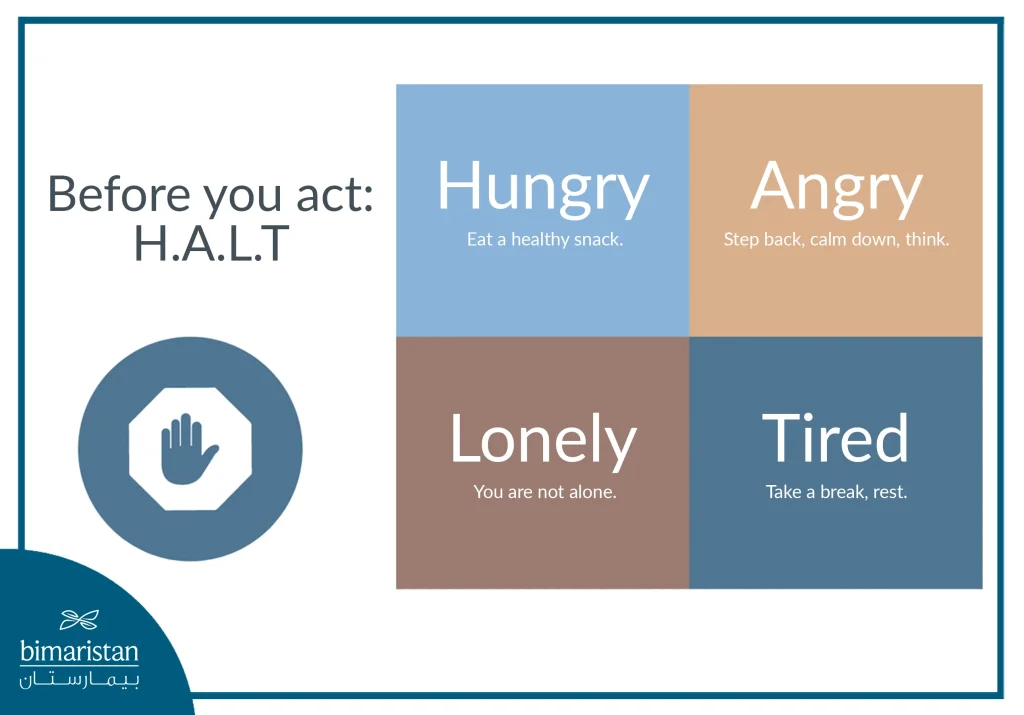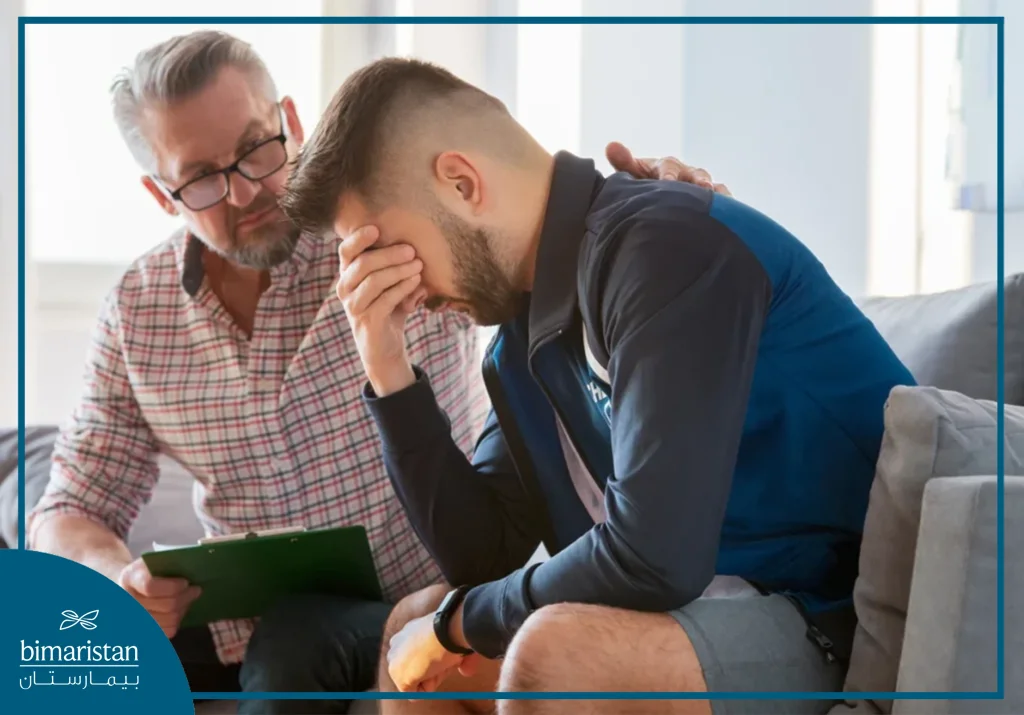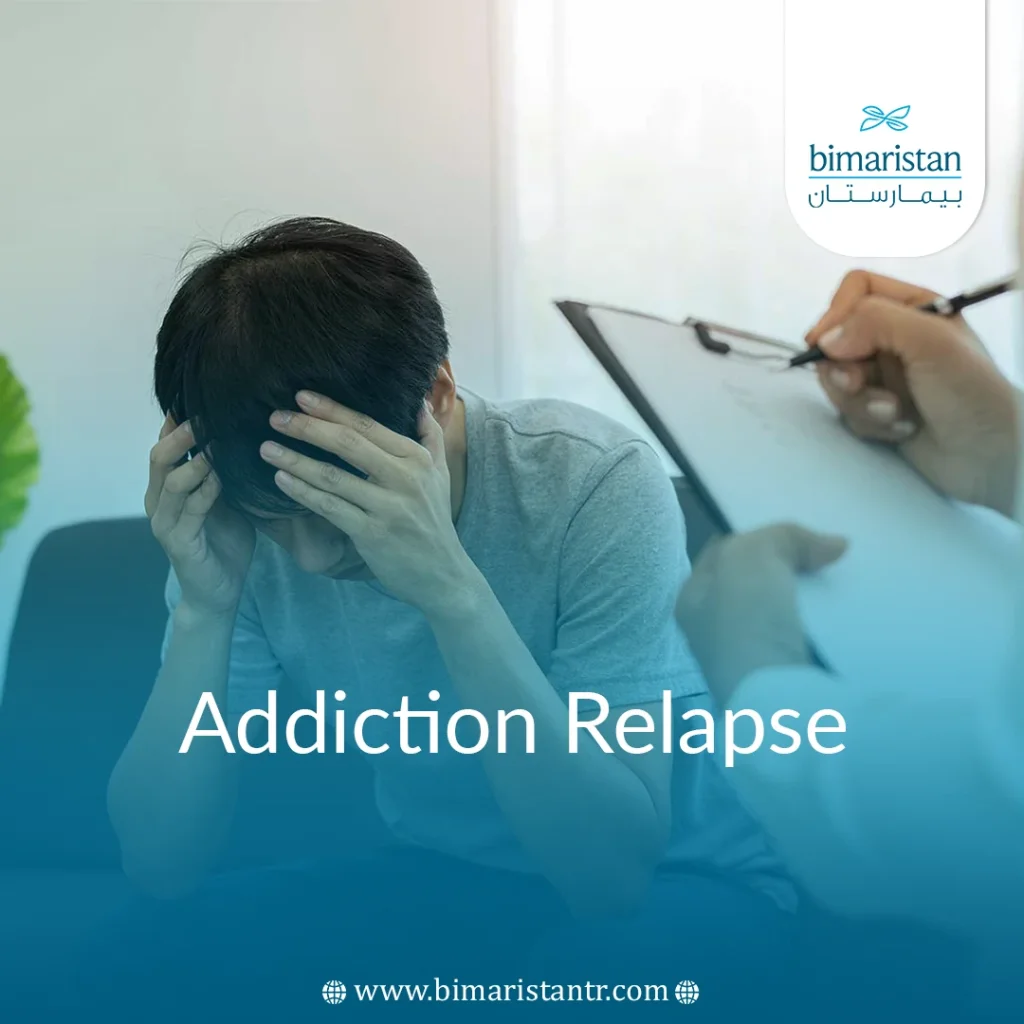Overcoming addiction is a great accomplishment for the addict, but they must also feel what many other people who have walked the same path have felt, which is the fear of relapse after addiction treatment. It is relatively common to relapse after sobriety, with a relapse rate of approximately 25 percent of patients.
According to the model developed by Marlatt and Gordon, Relapse begins with a high-risk situation followed by a poor coping response. When this situation occurs, the patient experiences a decrease in self-efficacy and is more prone to relapse.
What is Addiction Relapse?
Relapse is when a person returns to a substance or behavior entirely after a period of recovery. At the same time, a similar term, Slip, describes a short period of returning to addictive behavior and then quitting again. Many people recovering from addiction face a consistently high risk of relapse because chronic substance use can lead to specific structural and functional changes in the brain that take a long time to normalize.
Types and stages of relapse
Traditional relapse occurs when a person in recovery makes a conscious decision to return to addictive behavior; for example, they may choose to smoke marijuana to relieve stress a year after quitting or have a glass of wine with friends because they feel they can handle it without overdoing it, while free relapse is the slang term for accidental relapse that occurs when a person uses drugs or alcohol unintentionally and can happen when they accidentally drink alcohol thinking they are drinking a non-alcoholic beverage.
Sometimes, a recovering person begins to take steps toward relapse unconsciously weeks or months before actually drinking or using drugs. Specific thoughts, feelings, and events can trigger cravings and urges to return to addictive behavior and, if not handled properly, can increase the chances of relapse.
Relapse often occurs in a series of 3 stages:
- The emotional relapse phase begins long before the relapse into addictive behavior. At this stage, the patient begins to fail to deal with their emotions healthily; they may suppress their feelings, isolate themselves from others, deny the existence of specific issues, and neglect self-care. Although the patient may not consciously think about returning to addictive behavior at this stage, avoiding difficult emotions and circumstances may be the basis for future relapse.
- During the mental relapse phase, the patient realizes that he or she has conflicting feelings between recovery and relapse into addictive behavior. While part of him or her may want to stay healthy, another part may be struggling with cravings and secretly thinking of ways to relapse. Mental relapse also includes missing the previous state of use, minimizing the negative consequences of use, and looking for opportunities to get high.
- The physical relapse phase involves the final act of using drugs or alcohol. Physical relapse can reach a state where the patient becomes more addicted than they were before recovery.
Learn more about: Stages of Addiction Treatment
Common Causes of Addiction Relapse
People often experience risk factors in the days, weeks, or months leading up to the actual time of relapse. These factors usually come in the form of conflicting emotions or difficult experiences that challenge their ability to cope with life without relapsing into addictive behavior, and the greater the number of risk factors, the greater the risk of relapse. Some of the most common risk factors for relapse include
Exposure to stimuli
Triggers can include social and environmental cues that remind you of drugs and alcohol. Social cues – such as seeing a drug dealer or friend using drugs – and environmental cues – such as touching objects, smells, or places that you associate with drugs and alcohol – can trigger cravings that may lead to relapse.
Stress and pressure as triggers for relapse
If a patient is exposed to high levels of stress and has poor coping skills, they may resort to drugs and alcohol to relieve stress. Negative emotions such as anger, anxiety, depression, boredom, work, and marital stress sometimes increase the risk of relapse.

Personal problems
Conflicts with family and friends can lead to negative emotions. If not properly managed, these feelings can lead to relapse. Conflicts with others are responsible for more than 50% of all relapse cases.
Pressure from family members or friends who engage in addictive behaviors increases the risk of relapse after treatment. Sometimes, just being around other people who use drugs or drink alcohol can trigger intense cravings that make a recovering person more likely to relapse. Having a limited or negative support system can make it challenging to deal with life’s difficulties effectively without using drugs or alcohol.
Low self-esteem
Studies have shown that people with low self-confidence in their ability to recover are more likely to relapse. At the same time, those with a sense of self-control are more likely to deal effectively with their recovery journey.
Excessive positive mood
It may come as a surprise that positive emotions – not just negative ones – are also risk factors for relapse because the feeling of happiness is addictive, and a person may want to reinforce these feelings with drugs and alcohol.
After listing the common causes of relapse, it is essential to note that always viewing relapse as a hostile state can cause additional psychological damage because it reinforces feelings of guilt and shame that can hinder the ability to recover from a relapse. For the recovering person, recovery is a process of personal growth that usually involves some relapses, so instead of viewing relapse as a shame, it should be viewed as an essential learning experience to reach full recovery.
Early warning signs of addiction relapse
Relapse can be stopped early by understanding the stages of relapse described above. It may be easier to prevent relapse when it is in the emotional relapse stage, which begins long before relapse into addictive behavior. Several key signs, including the following, can characterize this stage:
- Failure of the patient to deal with their negative emotions in a healthy way
- Suppressing emotions and withdrawing from others
- Denial of the issues surrounding the patient
- Neglecting self-care
- Lack of concern for others
This stage is the bridge between addiction and recovery, as the transition between the two previous states is effortless at this stage, so patients at this stage must be treated seriously to protect them from reaching an actual relapse.
Effective addiction relapse prevention strategies
Relapse prevention skills are essential to learning how to cope with recovery properly. Recovery from alcohol or other drugs is a process of personal growth that involves several stages. At any stage of recovery, there is a risk of relapse, which makes knowing and understanding relapse prevention skills critical. The best relapse prevention skills include the following:
Self-care
Common symptoms in addiction recovery include insomnia and fatigue, and the Office of Alcoholism and Substance Abuse Services of New York (OASAS) states that these symptoms are common triggers for relapse. A patient can improve the quality of their sleep by exercising, eating a balanced diet, and by creating and following a structured sleep, exercise, and eating schedule. Through this system, one can retrain the body to sleep better, which helps reduce the risk of relapse.
The H.A.L.T. strategy and the role of psychotherapy in addiction relapse prevention
This word is an acronym for Hungry, Angry, Lonely, and Tired. The goal of this strategy is for the patient to ask themselves if they feel any of these symptoms whenever they feel the urge to use. The reason is that hunger, anger, loneliness, and tiredness are some of the most common triggers for relapse. A recovering person can help minimize the risk of relapse by taking a regular inventory of these symptoms and knowing how to deal with them.

Mindfulness and Mindfulness Meditation Techniques
Mindfulness is a concept that teaches individuals to become more self-aware to better deal with potential triggers for relapse. A study conducted by the National Center for Mindfulness Research found results indicating significant improvement in individuals in recovery who follow a mindfulness meditation relapse prevention program versus those who do not. Mindfulness meditation techniques involve encouraging participants to learn to live with their desires rather than fight them. Accepting that desires may come with time and take time or that some harmful desires may not be fulfilled is the ultimate goal of the technique.
The basic concept of mindfulness is to pay attention and focus on what you are doing. To become self-aware, observe what you’re doing without judgment. It can be helpful to write down your daily activities and review them at the end of the day.
Recognize and avoid triggers
Triggers can be internal (anxiety, stress, anger, low self-esteem) or external (people, places, or things that remind one of the addictive behavior). Making a list of internal and external triggers is an effective way to increase awareness of triggers and reduce the risk of relapse.
Regularly participating in support groups for alcoholics or drug addicts provides support, accountability, education, and the ability to meet peers who understand what the addict is going through. Peer support is an essential component of recovery and also prevents relapse because it minimizes feelings of loneliness and the risk of isolation.
How do you deal with a relapse if it happens?
Knowing how to handle a relapse can help you prevent future relapses and recover if you do. Remember, no relapse is too big for you to recover from. If you or a loved one has experienced a relapse, consider taking action as soon as possible by:
Getting help and regular follow-up with a therapist
Seeking support from family, friends, and other sober people can help with dealing with a relapse. Feeling that you are not alone can help you feel positive emotions. The role of the doctor or psychotherapist at this stage is crucial. Regular follow-ups with the psychotherapist should be conducted, and the patient should share everything he or she feels to help him or her overcome the negative feelings.

Focus on self-care
It is important to take care of oneself emotionally and physically after a relapse. Taking care of one’s appearance can help increase self-confidence and reduce the stress and pressure caused by the relapse. Activities that bring pleasure and happiness, such as yoga, meditation, exercise, reading, journaling, and eating healthy foods, can be done without harm.
Studying the cause of addiction relapse
A setback can be seen as a learning experience rather than a failure. Consider how the setback happened, what happened before it, how to deal with the same situation if it happens again, and what alternatives are available.
In conclusion, understanding how relapse occurs is an important preventive strategy in course correction and deviating from this path is closely related to the patient’s sense of self-efficacy, if they feel confident in their ability to deal with stimuli and desires, the likelihood of relapse is very low.
Sources:
- American Addiction Centers
- National Library of Medicine
